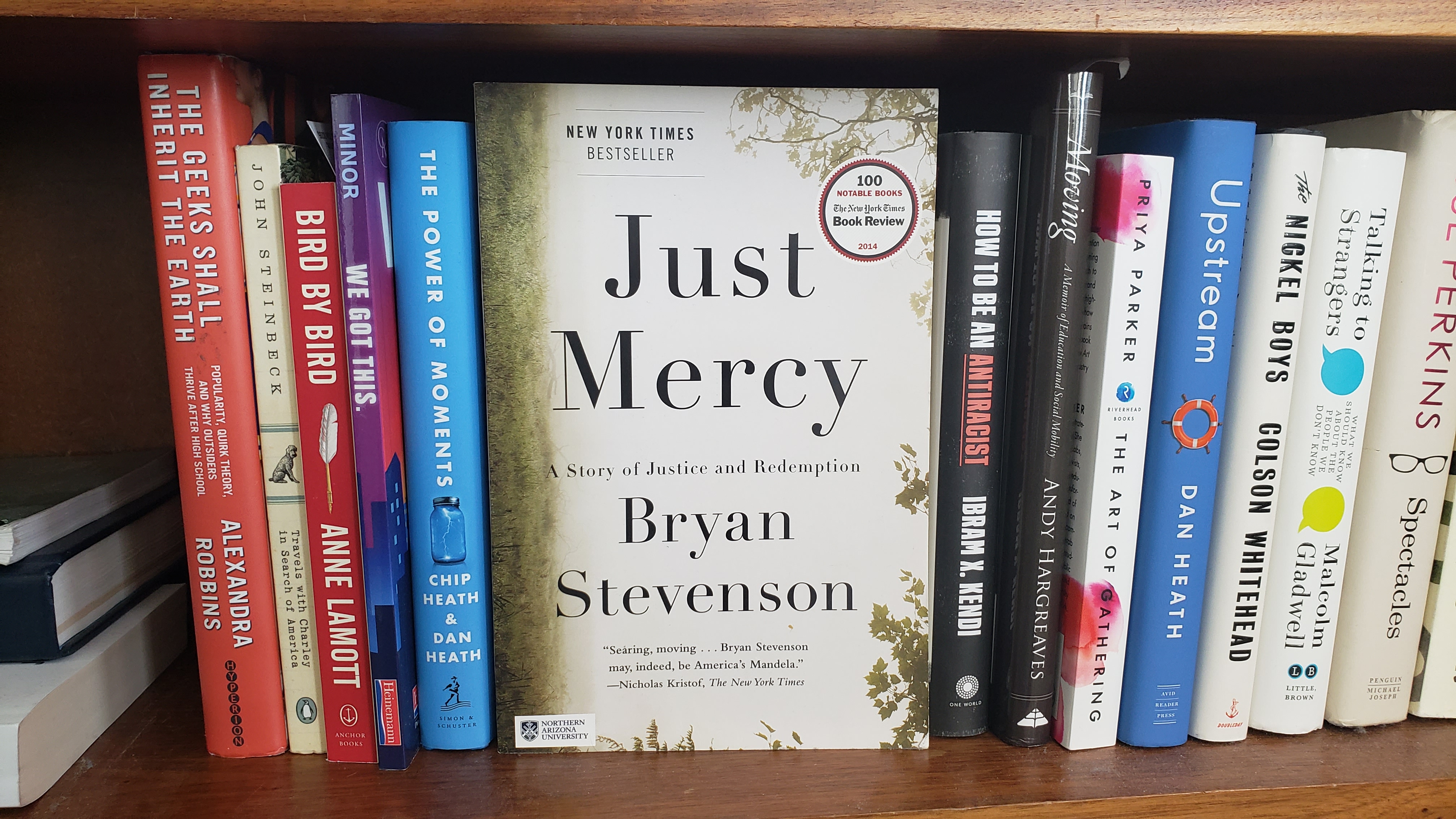Book Club Preview: Just Mercy by Bryan Stevenson
Spend an hour with Arizona K12 Center Executive Director Kathy Wiebke and other Arizona educators this October to discuss Bryan Stevenson’s New York Times bestseller Just Mercy.
Just Mercy is a memoir that personalizes the struggle of injustice. It is an unforgettable account of Stephenson’s journey as a young, idealistic lawyer and provides the reader a window into the lives of those he defends.
The Executive Director’s Book Club will be discussing Just Mercy on Wednesday, October 21, from 4:30 to 5:30 p.m. online. Go here to register for the event. If you register by September 30, we’ll mail you a copy of the book straight to your home!
Below, Wiebke shares why she selected Just Mercy for the book club and what she’s looking forward to discussing with others.
Why did you choose this book for the October book club?
In the fall of 2015, my niece Hannah was a freshman at Northern Arizona University. On a trip to campus, I took her out to dinner and she was telling me about this book she was reading, Just Mercy. She went on to explain that all the incoming freshmen received a copy of the book as well as faculty who taught freshmen. She went on to share that the idea was that no matter where you were from, everyone would have this one shared experience. I thought this was an incredible idea, as I knew she was struggling to make friends. But as the night wore on, I quickly learned that she loved this book and went into great detail about it.
The next day I got a copy of the book, and I could readily see the attraction. I was taken by not only the storyline but the author, Bryan Stevenson. In March 2016, he was the closing keynote at a conference, and, while others often leave conferences early, I was determined to get to the keynote early to not only get a good seat but to hear his keynote in its entirety. I was mesmerized by his story of social justice. Listening to him and reading the book gave me pause to think. Honestly, I thought that by the time you got to death row, you were guilty of a heinous crime. While I have always struggled with the death penalty, I understood it. His story was a wake-up call for me. Not only for those who are incarcerated but for those who are Black in America.
That keynote and this book were the beginning of my journey to become more aware of my own unconscious bias as well as racism in America.
What are you looking forward to discussing with others about this book?
I was raised in a middle class, white home in Scottsdale, Arizona. Going to school, there was one Black family that moved into the neighborhood. It wasn’t until I went to work with the Arizona Department of Education that I worked with any people of color. I have worked hard to get to know people and understand. I was also brought up to believe in authority and the police. These last four years, that trust has been seriously eroded. I want to believe the good in everyone, but that is naïve.
I want to learn. I have been afraid to talk about race for fear I would say the wrong thing. I once made a glib remark and deeply offended someone at the table. I don’t like being in that position. But I remember what Cornelius Minor shared with me, “You can’t teach what you don’t know.” So, I am on a quest to learn from others.
How do you think this book might speak to teachers especially?
I have always seen this injustice as a thing experienced by Black males. I don’t know why. I suspect it is media influence. So, I was struck by a series of personal stories that comedian and writer Amber Ruffin shared on Late Night with Seth Meyers. I was struck by her stories. One thing that has continued to haunt me is when she said, “Every Black person has a story like mine.”
I remember speaking to a friend who is Black. I remember telling him that this comedian said that every Black person has a story. He quickly responded, “Kathy, you want stories? I have lots to share. When I was 8 years old, my family moved into a home in Pittsburgh. Someone painted swastikas on our house and threw a brick through our window.” I was shocked. I remember sharing that an event like that, especially when you are 8 years old has got to have a significant impact on your life and how you look at the world. He said it absolutely does, and, if it weren’t for his parents, his life could have easily taken a very dark turn.
Unfortunately, I do not think his story is unique. As teachers, it behooves us to learn and understand. I think now more than ever, teachers are searching for the same answers as I am. I would like to come together with them to explore this topic and, in the process, be open to new ideas.
Any additional thoughts to share about Just Mercy?
Six years later, I continue to be a fan of Bryan Stevenson. If I could have one “get” for the Arizona K12 Center, it would be to have him speak at one of our events. Today, he is the founder and executive director of the Equal Justice Initiative, a human rights organization in Montgomery, Alabama. In 2018, 60 Minutes did a segment with Bryan Stevenson on the National Memorial for Peace and Justice, honoring more than 4,000 victims of lynching in America.
Register by September 30 to receive Just Mercy in the mail and to join the Executive Director’s Book Club for the discussion on Wednesday, October 21, from 4:30 to 5:30 p.m. online. Register here.










